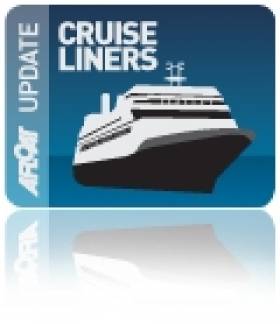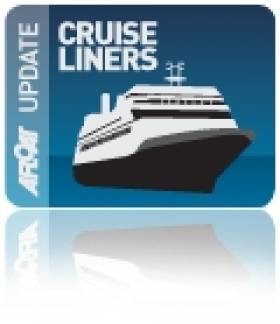Displaying items by tag: Caronia
Cruiseship Calls to Dublin Includes Ship-to-Ship Refuelling
Some six hours previously Swan Hellenic's sleek Minerva (1996/12,500grt) picked up a pilot off Dalkey after sailing overnight from Portsmouth. She was followed astern by Saga Cruises Saga Ruby (1973/24,292grt) from Dover and likewise she too picked up a pilot close to the South Burford bouy. Incidentally Minerva had operated for Saga Cruises as their Saga Pearl but in recent years she has returned to her original name.
The classic lines of Saga Ruby are attributed to her combined ocean liner/cruiseship design when launched Vistafjord in 1973. The vessel was built by Swan Hunter Shipbuilders for Norwegian America Line. A decade later she was sold to Cunard Line who retained her original name until 1999 when she became the third Caronia. To read more about this former 'Cunarder' click HERE and how her interior looks now click HERE.
Dawn Princess departed Dublin this mid-afternoon bound for Cobh. Minerva is to due to leave around midnight while Saga Ruby remains overnight, in fact her call is particularly leisurely as she does set sail from the capital until tea-time tomorrow.
- Dublin Port
- Cobh
- Cruise Liners
- bunkers
- dalkey
- Princess Cruises
- Cobh Cruise Terminal
- Cruiseships
- Port of Dublin
- Ports and Shipping News
- Ocean Pier
- Cunard Line
- Cruiseliners
- Saga Cruises
- Saga Ruby
- Caronia
- Cruise Liners news
- Cruise ships
- Swan Hellenic Cruises
- Dawn Princess
- Minerva
- Refueling
- Dublin Cruiseships
- Dublin cruisecalls
- Saga Pearl
- Coastal tanker
- South Burford bouy
- Cunarder
Floating City Hotel to Mark Start of Islands Cruise
Passengers embarking in Dublin Port for a cruise next month will firstly spend their first night onboard while docked in the capital, writes Jehan Ashmore.
The classic cruiseship Saga Ruby will welcome her passengers and after checking in they can explore the 4-star rated vessel followed by dinner, marking the first evening of an eight-night cruise of the Faroe, Orkney & Outer Hebridean Islands.
On the following day passengers can remain onboard and enjoy the facilities or take an optional tour of Dublin or Wicklow prior to returning to the cruiseship for the evening departure on 24 July.
Prices start from €1,159pp in a twin inside cabin, for more information on other cabin categories and the cruise from John Galligan Travel click here.
Saga Ruby is one of the last traditionally built cruiseships, featuring spacious wooden decks in particularly on the tiered decks overlooking her cruiser stern. The 24,492 tonnes vessel joined Saga Cruises in 2005 after a $17m refit and was at one stage was the Caronia of Cunard Line, but she started her career as Vistafjord for Norwegian America Line as a combined cruise-liner /cruise-ship when built in 1973. To read more about the classic ship click here.
She can take over 600 passengers and is currently operated by the Saga Cruises which caters primarily for the UK over-50's market noting passengers can be accompanied by adults over 40.

























































